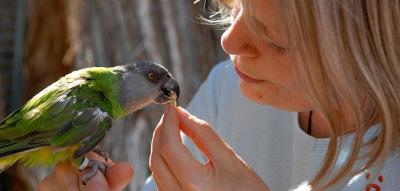
The Best Parrot Diet (and Toxic Foods to Avoid)
Parrot diets should consist of a combination of a high-quality pellet and fresh foods. Contrary to popular belief, most parrots should not be fed seed mixes. Small bird species, such as budgie parakeets or cockatiels, can have a mixture of high-quality seed and pellets because of their high metabolism and energy expenditure. But seed is not appropriate for larger species, such as Amazons, greys, macaws, and cockatoos, because they do not provide enough healthy nutrients. Plus, unhealthy seed mixes often contribute to health conditions in pet birds, including excessive weight gain and liver disease.
Pellet diets for parrots
The current recommendation by board-certified avian veterinarians who study avian nutrition is that pellets should make up 50-70% of a parrot's diet. The best pellets to feed your parrots are those that do not contain additives, such as sugar or dyes, because these ingredients can have a cumulative effect in the body and cause diseases over the long term, possibly even shortening a bird's life span. Recommended pellet brands include (but are not limited to) Lafeber, Harrison’s, Roudybush, Zupreem Naturals, Hagen, TOPS (Totally Organic Pellets), and Caitec Oven Fresh Bites.
Many parrots have never learned how to eat a healthy pellet diet, but they can be taught to do so through a gradual conversion process. Discuss the process with an avian veterinarian to ensure that your bird is getting the proper nutrition.
Fresh foods that are safe and healthy for birds
The remaining 30-50% of a parrot’s diet should be composed of fresh foods, including these:
Home starts with you
- Raw or steamed vegetables (preferably organic)
- Cooked whole grains and/or pseudo-grains, such as rice (brown, wild, or forbidden), oats, barley, quinoa, buckwheat, amaranth, and teff
- Soaked and cooked or sprouted legumes
- Raw, soaked, or sprouted nuts and seeds
- Limited amounts of raw fruit
Fruits, seeds, and nuts should comprise no more than 10-20% of a healthy parrot diet. Many people envision parrots in the wild eating a diet of nothing but fruits and nuts, but researchers are discovering that, for most parrot species, this is somewhat of a misconception. In addition, wild birds expend a lot more energy than captive birds do, so they need the extra sugars and fats found in nuts and fruits. Plus, the fruits that they eat in the wild contain much less sugar and much more fiber than the fruits cultivated for human consumption.
Offer fruits, seeds, and nuts only as a treat, and focus mostly on fresh berries and raw, unsalted nuts. Avoid giving peanuts, as these can be dangerous. Other nuts, such as almonds, pecans, and walnuts, can be used. Always check the food for mold or rot before giving it to a parrot.
Parrot chop
An easy, efficient, and cost-effective way to provide a wide variety of fresh foods to your bird daily is to make something called “chop.” Chop is exactly what it sounds like: You cook a big batch of grains and legumes, finely chop up a variety of vegetables, and mix it all together in a large container. You then spoon three to four individual daily servings into sandwich bags or other containers, and put them in the freezer.
Depending on how much you make and how many birds you have, one batch of chop can last anywhere from one week to several months. Chop can be customized to the individual bird’s preferences, but you can also try sparking curiosity by mixing in new ingredients. See the Recipe Posts page on Parrot Nation for more information about how to make chop.
Toxic foods that birds should never eat
Toxic foods that you should never feed to your pet birds include:
- Alcohol
- Avocado
- Cassava (tapioca)
- Caffeine
- Dairy products
- Onion, garlic, scallions
- Meat
- Mushrooms
- Chocolate or cocoa
- Peanuts
- Fruit seeds and pits
- Uncooked beans
Foods that should also be avoided in a healthy bird diet include anything that is high in salt, fat, and sugars and/or foods that contain dyes or preservatives.
